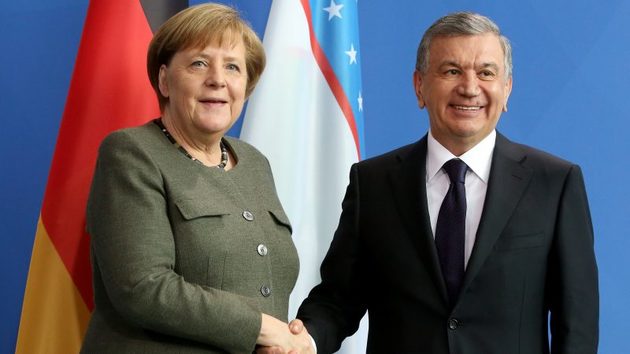Uzbekistan has been through significant policy changes over the past five years. Under the leadership of Shavkat Mirziyoyev, the country has moved from an isolated dictatorship into a young democracy, from a shadow economy into a liberalised market, from a weak state into a regional player, writes Vita Kobiela, Euractiv reports. Vita Kobiela is a communications co-lead of Volt Belgium, the first pan-European political party and movement. Being at the heart of Central Asia, Uzbekistan has geostrategic importance not only for a rising China or historically present Russia but also for the European Union. First of all, as a transport and transit hub, which lies at the heart of the Chinese New Silk Road Initiative, the Russian Eurasian project and the EU-Asia connectivity strategy, Uzbekistan creates a platform that connects the Eurasian continent and brings worlds’ economies together.
The country has already managed to fruitfully cooperate with China and Russia at the same time. When it comes to Europe, even though the region (as well as Uzbekistan itself) has been for a long time neglected, surprisingly in 2019, the EU has become a top trade partner to all Central Asian states as a whole region, having 24,1% of their total trade. This is also true for Kazakhstan and Uzbekistan, two regional leaders that are constantly improving their trade relations with the EU27, importing more to the EU than exporting. In this sense, Uzbekistan is a perfect place for European businesses. The country has created one of the most favourable business environments in the region. It attracts foreign investors and companies that strive for more ambitious regional targets.
At the moment, Uzbekistan has more than 15 free economic zones and over 100 small industrial zones established to create the best opportunities for foreign investors and entrepreneurs, exempting them from many taxes and fees for up to 10 years. Adding to this the World Bank ranking on the ease of doing business, which placed Uzbekistan high above its neighbours, and hundreds of European businesses already present in the country, shows that despite the geographic distance, massive Chinese investments, and Russian attempts to regain influence in the region, interaction and cooperation among the European and Central Asian region have continued to increase. Secondly, Uzbekistan’s GDP is expected to reach that of Kazakhstan in 15 years’ time and continue to grow. In contrast to Kazakhstan, Uzbekistan strives for its own economic model and destiny, based on its human capital and economic diversification.
In terms of regional cooperation, Mirziyoyevs’ initiatives for the settlement of problems accumulated in Central Asia (delimitation and demarcation of the boundaries between the Central Asian states, resolving water and border-crossing issues, and the first heads-of-state meeting for the fractious region in March 2018 – to name but a few) show that Uzbekistan is actively coordinating the development of the region. What is more, the country has a keen interest in its stability, prosperity and freedom from external political influence.
Lastly, a stable and prosperous Central Asian region, confidently and independently balancing between Russian and Chinese influence, leading by the Uzbekistani example, will become a reliable energy partner of the EU. Even today, with a complete Russian monopoly over gas export routes from Central Asia, the region is a source of significant energy imports for Europe.
It will become essential for the Europeans if the central Asian countries could manage to break Russia’s grip on the pipelines by launching, for example, the Trans-Caspian shipping route in cooperation with the EU. This project may well serve Europe and Central Asia’s economies, which are capable of exporting a lot to the EU but physically cannot do it.
These are only a few arguments about why the EU must increase its visibility and capabilities in the region, relying on its external policies on Uzbekistan. No one could deny, however, that the arguments presented above – although they are rational – are more market-oriented, and that means not convincing enough for the European audience.
In terms of values, since 2016, Mirziyoyev followed an innovative policy to transform Uzbekistan’s decision-making processes, electoral legislation, encourage political competition, invigorate civil society, address human rights and the rule of law issues.
In doing so, he has already reshaped the domestic political landscape, changed the fundamental relationship between the citizen and state. Uzbekistan is indeed confidentially and surely moving towards democracy and the rule of law, thus stabilizing its society and reassuring both its citizens and foreign investors.
Uzbekistan is the ally of the European Union in supporting and promoting the principles of multilateralism. After many years of international isolation, new Uzbekistan has already initiated many UN resolutions, organised and keep organising global, international and regional forums, projects based on these principles.
Uzbekistani efforts were well-noted by the international community, as for the first time in its history, the country became a member of the UN Human Rights Council, the piece of news that speaks for itself. Uzbekistan has shown a huge interest in upgrading relations with the EU. Through GSP+, support for membership of the WTO, and the negotiation of an Enhanced Partnership and Cooperation Agreement. Furthermore, the country has proved many times that when it comes to climate, business, digital, educational, tourism issues, it clearly prefers to cooperate with the EU. In conclusion, Europeans should acknowledge the boldness and enormous achievements of the country that is showing a political will to change its historic path and engage in important regional and global initiatives.
However, for Mirziyoyev’ efforts to succeed, Uzbekistan needs European support. The country expects more technical and financial European assistance which is essential for research, innovation, technology and human resources training to boost its sustainable development, but above all political support, particularly in the light of the upcoming presidential elections. The EU must therefore send a strong message of support and engagement to Uzbekistan.






